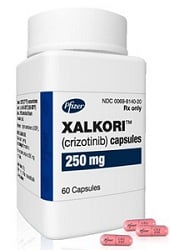 Pfizer's ($PFE) Xalkori is already used to treat patients with metastatic non-small cell lung cancer whose tumors are ALK-positive. But now it's on its way to snagging a speedy nod in another group of NSCLC patients, too.
Pfizer's ($PFE) Xalkori is already used to treat patients with metastatic non-small cell lung cancer whose tumors are ALK-positive. But now it's on its way to snagging a speedy nod in another group of NSCLC patients, too.
The FDA has granted the pharma giant a priority review for the drug in patients with ROS1-positive forms of the disease, the company said Tuesday--a designation that'll help it advance toward a thumbs-up by April if all goes well for the drugmaker.
If approved, Xalkori would be the first biomarker therapy green-lighted in the U.S. for the ROS1 patient population. And though that's a small one--affecting about 1% of NSCLC sufferers, according to Pfizer--it's an indication "where you have a long duration of treatment," CEO Ian Read said on the company's Q3 earnings conference call.
And small patient pools haven't stopped Xalkori so far. The drug racked up $438 million last year thanks to its $11,500-per-month price tag, and analysts have predicted it'll be able to crack the blockbuster barrier by 2020.
But cost gatekeepers in Europe have put a damper on things since the med rolled out in 2011, and there's new competition on the scene, too. Both the U.K.'s National Institute for Health and Care (NICE) Excellence and Germany's Institute for Quality and Efficiency in Health Care (IQWiG) shot the med down in 2013, and Novartis ($NVS) is trialing its Zykadia as a first-line treatment for patients with ALK + NSCLC that would go up against the Pfizer med.
Luckily for Pfizer, it has newcomer Ibrance putting up big numbers to help buoy its oncology unit; last quarter, cancer drug revenues shot up by 54% thanks to a $230 million haul from the breast-cancer-fighter that buried the $195 million figure analysts expected.
Special Report: Top 10 best-selling cancer drugs of 2013